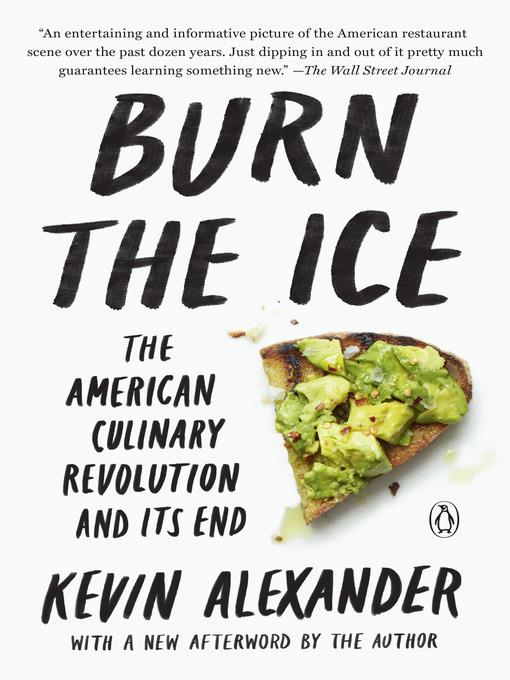
Burn the Ice
The American Culinary Revolution and Its End
کتاب های مرتبط
- اطلاعات
- نقد و بررسی
- دیدگاه کاربران
نقد و بررسی

April 29, 2019
In this well-researched, witty food industry history, James Beard Award–winning journalist Alexander takes a deep dive into the recent culinary culture of America. He posits that 2006 marked the beginning of a 12-year “golden age of American dining” when gastronomic experimentation blossomed in up-and-coming food capitals across the country, beyond New York City and the Bay Area. After the 2008 financial crash, scrappy young cooks launched a “veritable food Valhalla” of creativity and innovation “with as little money as possible,” celebrating local foods and glorifying “rural-chic” craftsmanship (like “hand-pickled... pickles”). The author follows prominent chefs, restaurateurs, bartenders, and neighborhoods that exemplified the zeitgeist: chef Gabriel Rucker’s irreverent interpretations of French cuisine at Le Pigeon propelled casual fine dining in Portland, Ore., and nationally, while André Prince Jeffries grew her family’s local hot chicken restaurant in Nashville, inspiring hot chicken competitors and sparking a nationwide obsession. Alexander’s sharp wit keeps the narrative moving, notably with a take-down of Guy Fieri (that riffs on a notorious New York Times review of a Fieri restaurant) that begins with the question, “How do you really feel about Guy Fieri?” This astute reflection on an era of American food culture will give foodies a new perspective on the restaurants they love and the dining experiences they’ve grown to expect.

May 1, 2019
A back-of-the-house, behind-the-scenes look at new restaurants and passionate chefs. Making his book debut, James Beard Award-winning food journalist Alexander offers an energetic, scattered chronicle of the food world from 2006 to 2017, a decade, he asserts, when "independent, chef-owned, casual fine-dining restaurants" created a culinary revolution. He locates the revolution's birth in Portland, Oregon, where a young chef named Gabriel Rucker opened a small restaurant, Le Pigeon, generating hype that "morphed from local buzz into a national fever pitch," putting Rucker--and Portland--on the map of culinary stardom. Rucker, writes the author, invented a new aesthetic: "the mismatched chairs, the Goodwill plates and silverware, the lack of tablecloths," along with "scratch-kitchen-level food made by hand using local ingredients." Rucker is one among the many individuals Alexander profiles, gleaned from nearly 100 interviews with cooks, chefs, and bartenders whose ambitions, challenges, successes, and failures add up to "a mosaic of the last decade's sprawling, mercurial, pyrotechnically creative culinary ecosystem." There's Tom Colicchio, who learned how to cook by working at top New York restaurants. At 26, he earned a three-star review from the New York Times, soon opened Gramercy Tavern with prominent restaurateur Danny Meyer, and went on to establish his own restaurant, Craft, "radical in its simplicity." When reality TV producers wanted a chef to judge a food competition show, Colicchio was high on the list; the show was Top Chef. There's Anjan and Emily Mitra, who struggled to open an Indian restaurant in San Francisco and ended up so overwhelmed by their success that they lost sight of their original motivation to share the texture, balance, and "crazy versatility of flavors" of South Indian food. There's Phil Ward, innovator of the craft cocktail movement that spread across the country. Alexander's choice of characters seems random, and their stories, though engaging, don't cohere into an overarching analysis. Initially claiming that the revolution is over, the author concludes that "a fresh torch" is likely to be lit. A colorful yet rambling history of transformations in the food world.
COPYRIGHT(2019) Kirkus Reviews, ALL RIGHTS RESERVED.

July 1, 2019
James Beard Award-winning food journalist Alexander provides an ambitious, frenetic chronicle of what he deems the American culinary food revolution and its end. Beginning in 2006, Alexander credits Portland, OR--specifically chef Gabriel Rucker and his restaurant Le Pigeon--for prompting the rise of local, influential, casual fine-dining restaurants. The "Portlandization of American dining," he asserts, aided by the rise of social media and food blogs such as Eater and Serious Eats, helped make food a national obsession, accelerating food tourism, altering eating habits, and widening horizons, as craft cocktails became commonplace and warehouse clubs started selling sushi rice. Also profiled are chefs such as Tom Colicchio of New York's Gramercy Tavern; André Prince Jeffries, known for her specialty of Nashville's hot chicken; and Carolina barbecue pitmaster Rodney Scott. Alexander features both success stories and cautionary tales from food pioneers and innovators, local restaurant owners, activists, and famous chefs in a collection that can appear somewhat random and disconnected, but the author's unbridled enthusiasm and entertaining behind-the-scenes insights will likely appeal to loyal fans of food journalism. VERDICT A solid selection for medium and large collections where food memoirs fly off the shelves.--Emily Patti, Fox Lake Dist. Lib., IL
Copyright 2019 Library Journal, LLC Used with permission.

June 1, 2019
Over the past few decades, a new American gastronomy has sprung from a host of creative culinary artisans working over the stoves of restaurants across the country. James Beard Award-winning food journalist Alexander has visited with eminent chefs such as Tom Colicchio in New York and Gabriel Rucker in Portland, Oregon, who have each transformed what defines a successful restaurant. Thanks in no small part to the emergence of cable television stations focusing solely on food, many foresighted cooks have become celebrities in their own right. Ree Drummond has transformed herself into an economic powerhouse in her small Oklahoma town. Guy Fieri's spiky hair is instantly recognizable. On the other hand, this fame can turn on itself, and has devoured New Orleans' John Besh and superstar Mario Batali in the wake of massive sexual harrassment scandals. In contrast, Andr� Prince Jeffries took Nashville hot chicken to national prominence without compromising her personal tenets. In any case, in his first book, Alexander shows all sides of chefs who've transformed the American dining landscape.(Reprinted with permission of Booklist, copyright 2019, American Library Association.)

























دیدگاه کاربران